In the Archives’ collections, personal signatures are everywhere, littering correspondence, membership rosters, covenants, and random scraps of paper. These signatures come in all shapes and sizes, some deliberate and others barely more than doodles—breezy nicknames closing a letter, hasty initials scrawled on a memo, or elaborate signatures finalizing deeds and contracts, or legitimizing passports. Occasionally, signatures are accompanied by additional information, like a favorite biblical text, personal motto, illustrations, or decorative flourishes. Depending on the size and style of handwriting, signatures can give researchers insight into a subject’s personality, level of education, and even nationality.
This April, the Wheaton College Billy Graham Center Archives features the autograph album of Edna Asher Case (1905-1999), a Chicago native and 1929 graduate of Wheaton College. In the 1920s, autograph albums were a popular way to document and remember the places and people you encountered and to exchange personal messages. Case’s autograph album—a slim 4×6 leather bound book with brightly-colored pages—offers readers today a glimpse into the bustling world of 1920s American evangelistic fervor, captured in the sprawling signatures and well wishes of celebrity revivalists, musicians, and urban social work crusaders who spread the gospel through revival meetings and rescue missions in the city that came to epitomize the Jazz Age.

Born in 1905 to parents deeply involved in evangelism work in Chicago and St. Louis, Edna’s childhood coincided with the pinnacle of Billy Sunday’s revival ministry. Sunday’s traveling evangelistic team included Edna’s aunt, the vocalist and speaker, Virginia Healey Asher. Through her aunt’s connections, Edna was introduced to many of the leading evangelists and revival preachers of the early twentieth century whose signatures and personal messages fill her autograph book. The album contains dated entries spanning 1922-1929, and ranges from Chicago to Winona Lake, Indiana.

Billy and Helen Sunday
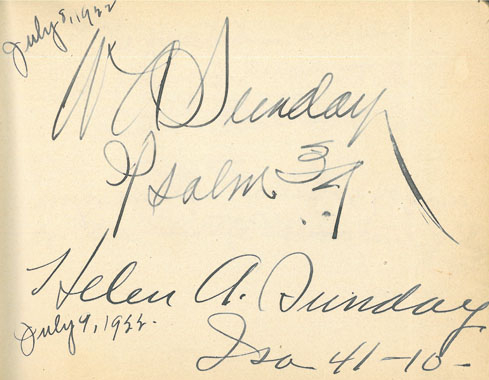
One of the most influential revivalists of the twentieth century, Billy Sunday (1862-1935) began his career as a professional baseball player with the Chicago White Stockings in 1883. Through the ministry of the Pacific Garden Mission in Chicago, Sunday converted to Christianity three years later and soon discovered that his skills on the baseball diamond transferred to the pulpit with electrifying results. From his first sermon in 1896 until his death in 1935, Billy Sunday became the most successful evangelists in American history until he was eclipsed by Billy Graham in the post-war era. Bolstered by the tireless support of his wife, “Ma,” Sunday’s success as an evangelist was partially due to his unconventional preaching style, combining onstage theatrics with fiery denunciations of sin. Evangelistic messages concluded with a call to repentance and an invitation to “walk the sawdust” trail to make a decision for Christ and receive salvation.
Inscribed a day apart in July 1922, William Ashley “Billy” and Helen Amelia “Ma” Sunday’s autographs feature prominently in Case’s album. Like many of the inscribers, the Sundays included a favorite biblical reference. Never one for understatement, Billy Sunday included all 22 verses of Psalm 34. “Ma” Sunday opted for the perennial favorite, Isaiah 41:10: “Fear thou not; for I am with thee: be not dismayed; for I am thy God: I will strengthen thee; yea, I will help thee; yea, I will uphold thee with the right hand of my righteousness” (KJV).
The Wheaton College Billy Graham Center Archives holds multiple collections with information about the Sundays’ ministry, including Collection 29: Ephemera of Billy and Helen Sunday and Collection 61: Papers of Billy and Helen Sunday.
William & Ida Biederwolf
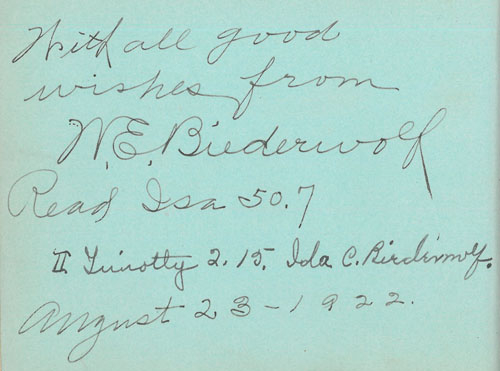
William Edward Biederwolf, following the lead of Billy Sunday and J. Wilbur Chapman, was one of the well-known evangelists of the early twentieth century. Unlike Sunday’s bellicose antics from the pulpit, Biederwolf’s preaching style reflected his education at Princeton University and the University of Berlin. Much like Billy Sunday, however, Biederwolf gained a reputation for tackling the major social issues of his day—the evils of gambling, dancing, moral laxity, and especially the consumption of alcohol. Between 1912 and 1917, Biederwolf preached and repreached his famous “Sermon on Booze,” a scorching indictment of the demon drink. Eventually published in pamphlet form, the sermon attributes the nation’s social ills to saloons, the “liquor traffic” and the “whiskey business.”
Collection 195: Papers of William Biederwolf contains scrapbooks, magazine articles, manuscripts of his sermons and speeches, correspondence and some other miscellaneous items documenting Biederwolf’s ministry.
Paul Rader
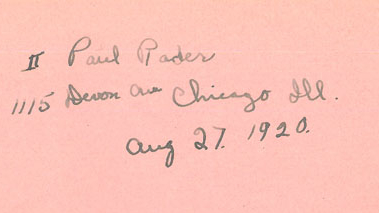
One of the most dynamic American evangelists of the twentieth century and (one whose ministry is richly documented in the Archives) was Daniel Paul Rader (1879-1938). The son of a Methodist Episcopal minister, Paul Rader became pastor of the independent Moody Memorial Church of Chicago in 1915, while simultaneously serving as vice president of the Christian & Missionary Alliance denomination, eventually becoming the denomination’s second president after the death of founder A.B. Simpson in 1919.
After leaving Moody Church in 1921, Rader launched a series of evangelistic meetings in a temporary structure at the corner of Barry, Clark, and Halsted streets on Chicago’s north side. The meetings proved so popular that Rader hastily converted the temporary building into a permanent one, and for the next decade the Chicago Gospel Tabernacle became a vibrant center of evangelism in Chicago, drawing visitors from all over the city and the Midwest. During Rader’s twelve-year pastorate, the Tabernacle expanded its focus to include a broad range of outreach initiatives, a flurry of publications, Bible conferences, youth clubs, missionary recruitment, and an ambitious social work program, including the food program, Paul Rader’s Pantry. Rader himself became a pioneer in religious radio programming, launching regular broadcasts from 1925 onward under the call sign WHT.
The history of the Chicago Gospel Tabernacle is well documented in the Archives in a variety of collections, including the Collection 133: Records of the Chicago Gospel Tabernacle and Collection 38: Ephemera of Paul Rader.
Homer Rodeheaver
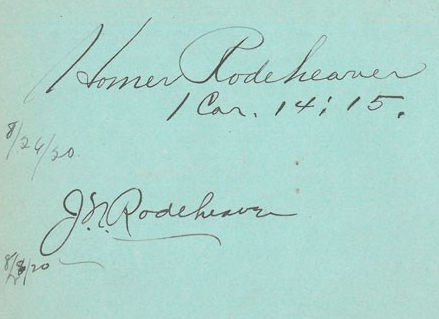
A accomplished trombone soloist and revival music director for many early twentieth-century evangelists, Homer Alvan Rodeheaver was a familiar figure on Billy Sunday’s evangelistic team, directing choirs, performing gospel songs and serving as master of ceremonies at Sunday’s evangelistic meetings for more than twenty years, starting in 1909. Except for the evangelist’s wife, Helen, Rodeheaver was likely the closest observer of Billy Sunday’s ministry and impact, especially during the height of Sunday’s ministry from 1910-1920.
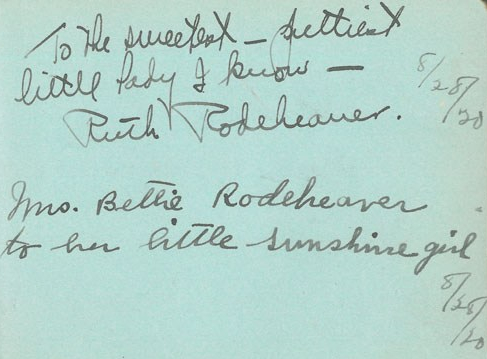
On the “Sunday Team” Rodeheaver often worked with soloist and evangelist Virginia Asher, whose voice is also featured on several of Rodeheaver’s albums.
By 1913, Rodeheaver had also joined the ranks of early gospel recording artists. Although he was more recognized for traditional “revival hymns,” he was also an unabashed advocate of the prohibition movement and composed songs detailing the social evils of alcohol.
In 1920, Rodeheaver, founded his own recording label, Rodeheaver Recording Company, which he used to obtain the copyright to hundreds of religious songs. After leaving the Sunday Team, Rodeheaver continued recording his own religious music well into the 1940s before before becoming musical director at Bob Jones University. His papers, described in Collection 130: Ephemera of Homer Rodeheaver, contains a wide range of sound recordings, as well as photographs, clippings, promotional materials, and newsletters documenting his ministry.
Homer Hammontree
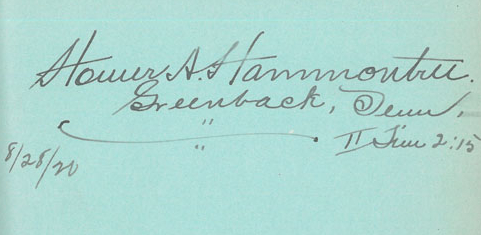
A graduate of Moody Bible Institute in Chicago where he later served as head of the music department, Homer Hammontree toured army camps during both World Wars, working as a song leader with evangelist Mel Trotter for nineteen years, as well as working closely with music director Homer Rodeheaver as a member of the Sunday Team. The Archives holds a small collection of Hammontree ephemera in Small Collection 40.
Grace Saxe
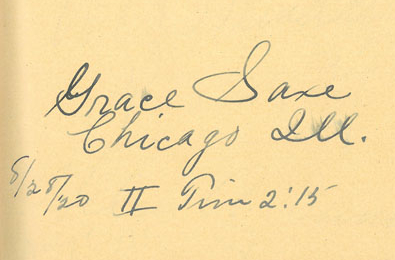
A dedicated member of Billy Sunday’s evangelistic team Grace Saxe served as the revival team’s Bible teacher after first working with evangelist R.A. Torrey. Saxe received her Bible training at Moody Bible Institute in Chicago, a vocation reflected in the Bible verse, II Timothy 2:15, that she chose to accompany her autograph: “Study to shew thyself approved unto God, a workman that needeth not to be ashamed, rightly dividing the word of truth” (KJV).
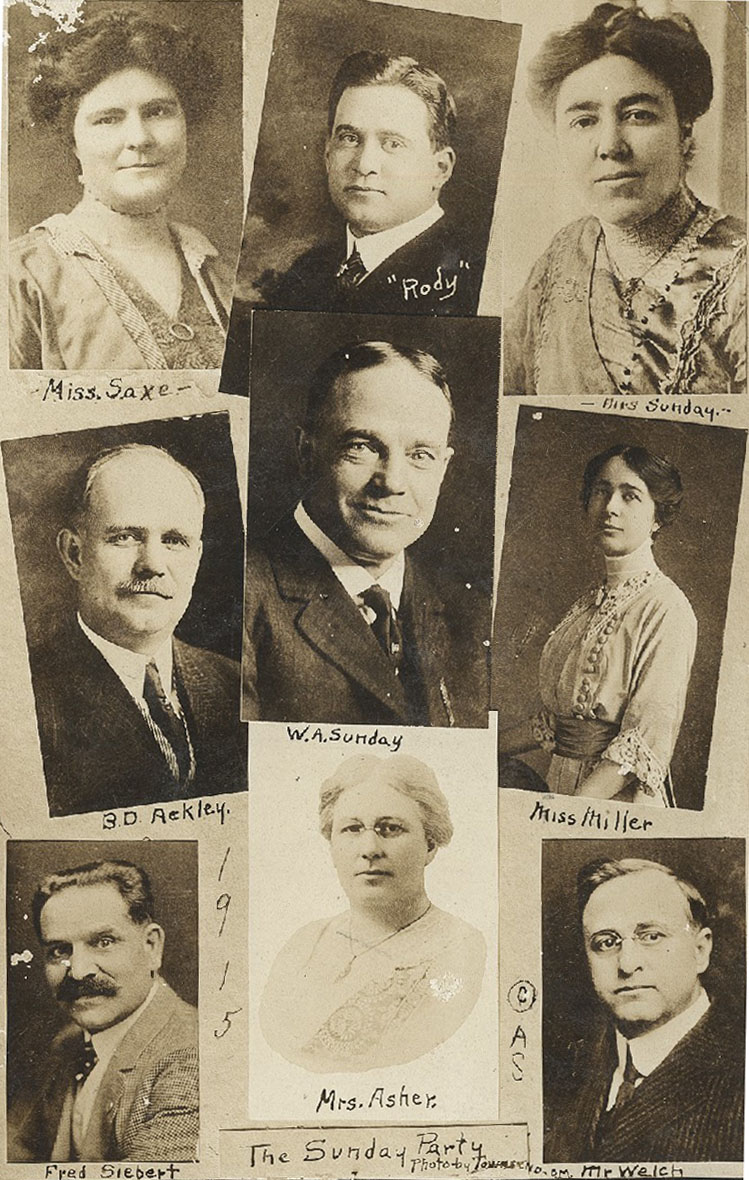
Edna Case’s autograph book is held the Collection 197 Papers of Virginia Healey Asher which contains more information about Asher’s contribution to Billy Sunday’s revival team and her own evangelistic and social work in Chicago and beyond.
Additionally, Collection 196, contains an oral history interview in which Edna Case describes her extended family’s ministry activities in the Greater Chicago area—like the Pacific Garden Mission—and her memories of evangelists Billy Sunday, Homer Rodeheaver, J. Wilbur Chapman, William Biederwolf, Paul Rader, and others.
Please can someone tell me when Corrie Ten Boo. Peeached At Winona lake, I was saved there , when Corrie took us to a back room to pray. I was 12 yrs old. I remember a auditorium with a lake next to it for kids to play.
Thank you
Pedro Diaz
LikeLike
What year was that, Pedro? I also heard her speak there and am trying to figure out what year that would have been.
LikeLike
I have a crusade hymnal Autographed by Billy Sunday, Grace Saxe, Francis Miller , and Annie Mclauren. The back leaf contains a note to Sunday from Annie to introduce the owner of the hymnal ( Mrs Ada Jephson) to him.
LikeLike